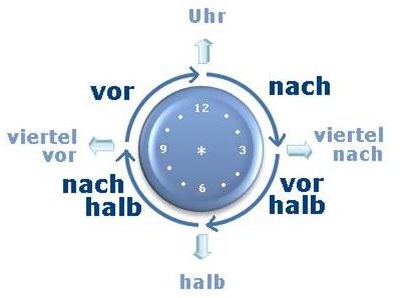to (locative), after (temporal), according to (modal).
The preposition "nach" is complicated because it is used in numerous different contexts with different meanings. The good thing is that it takes always dative. We’ll show you the different contexts now:
It is used to introduce a destination. "Nach" is used with any toponym* (name of a place) that does not have an article.
Ich fahre nach Deutschland
I’m driving to Germany
Wann fliegst du nach Amerika?
When are you flying to America?
* As long as they are not natural borders (rivers, seas) or islands.
"nach" is used together with adverbs of direction:
Ich gehe nach links
I’m going to the left
List of adverbs used with "nach":
| "nach" + Adverb | Meaning |
|---|---|
| nach vorn / vorne | forward |
| nach hinten | backward |
| nach links | to the left |
| nach rechts | to the right |
| nach oben | upward |
| nach unten | downward |
| nach innen | inward |
| nach außen | outward |
"nach" is used with cardinal directions:
Die Sonne wandert von Osten nach Westen
The Sun moves from East to West
| "nach" + cardinal point | Meaning |
|---|---|
| nach Norden | northward |
| nach Süden | southward |
| nach Osten | eastward |
| nach Westen | westward |
nach Hause is an expression that means home (As in “I’m going home”).
Morgen fliege ich nach Hause
Tomorrow I’m flying home
Sometimes, this can even be found as an adverb in one word "nachhause".
"Nach" is used to say the hour in German.

Viertel nach sieben
A quarter after seven (7:15)
Fünf nach halb drei
Two thirty-five (2:35)
Nach zwei Stunden war ich wieder zu Hause
After 2 hours I was home again
"nach" can be associated with units of time with "nächste" (the next) as well as with "diese" (this):
Nach der nächsten Woche
After next week
Nach diesem Monat
After this month
nach Montag
after Monday
Die Präsidentschaftswahl findet am ersten Dienstag nach dem ersten Montag im November statt
The presidential election is taking place on the first Tuesday after the first Monday in November
See the days of the week in German.
Nach Januar folgt Februar
After January comes February
See months of the year in Germany.
nach dem Gesetz
according to the law
One of the interesting things about German is that some prepositions such as "nach" can be placed before or after the words that they affect.
You can say:
Meiner Meinung nach or nach meiner Meinung (in my opinion)
Meiner Meinung nach ist das der beste Strand der Insel
In my opinion, this is the best beach on the island
The most important verbs with the preposition "nach":
"Nach" does not change, just like all the prepositions..
The words that follow nach have to be declined in the dative ("nach" takes always dative).